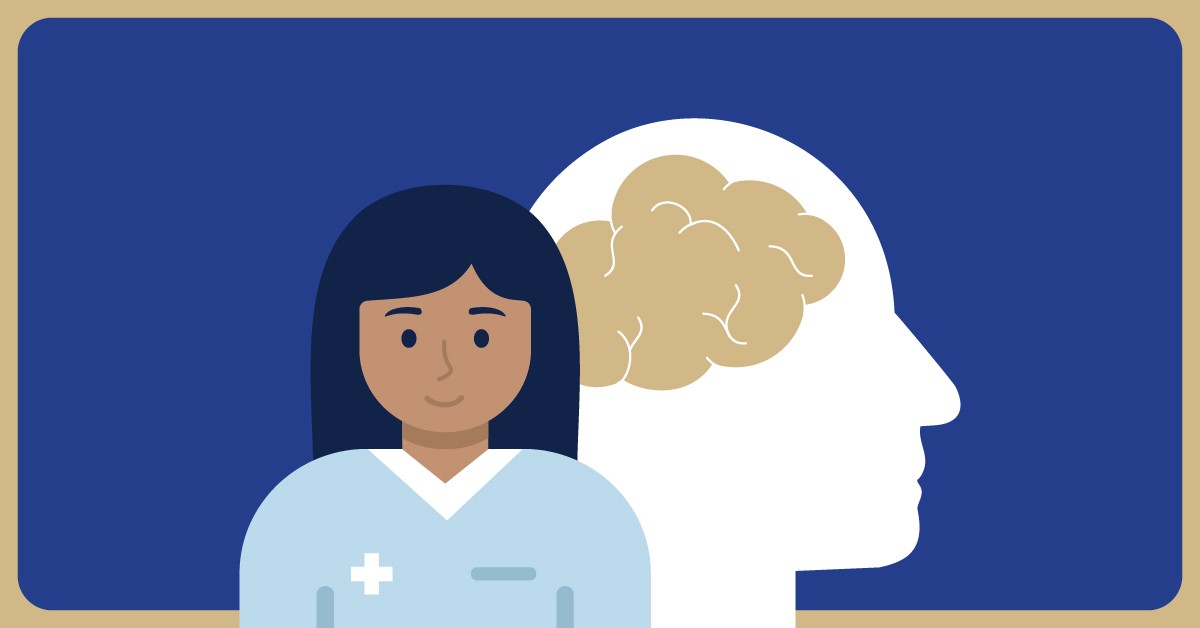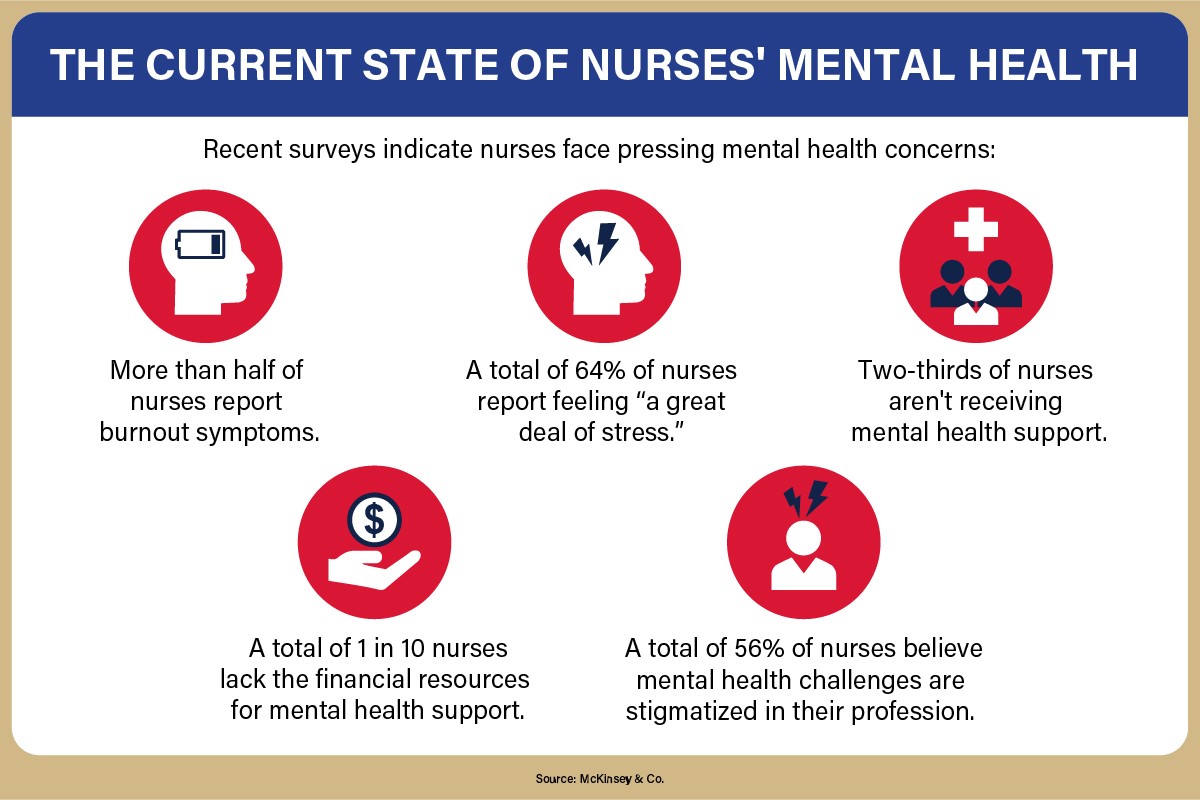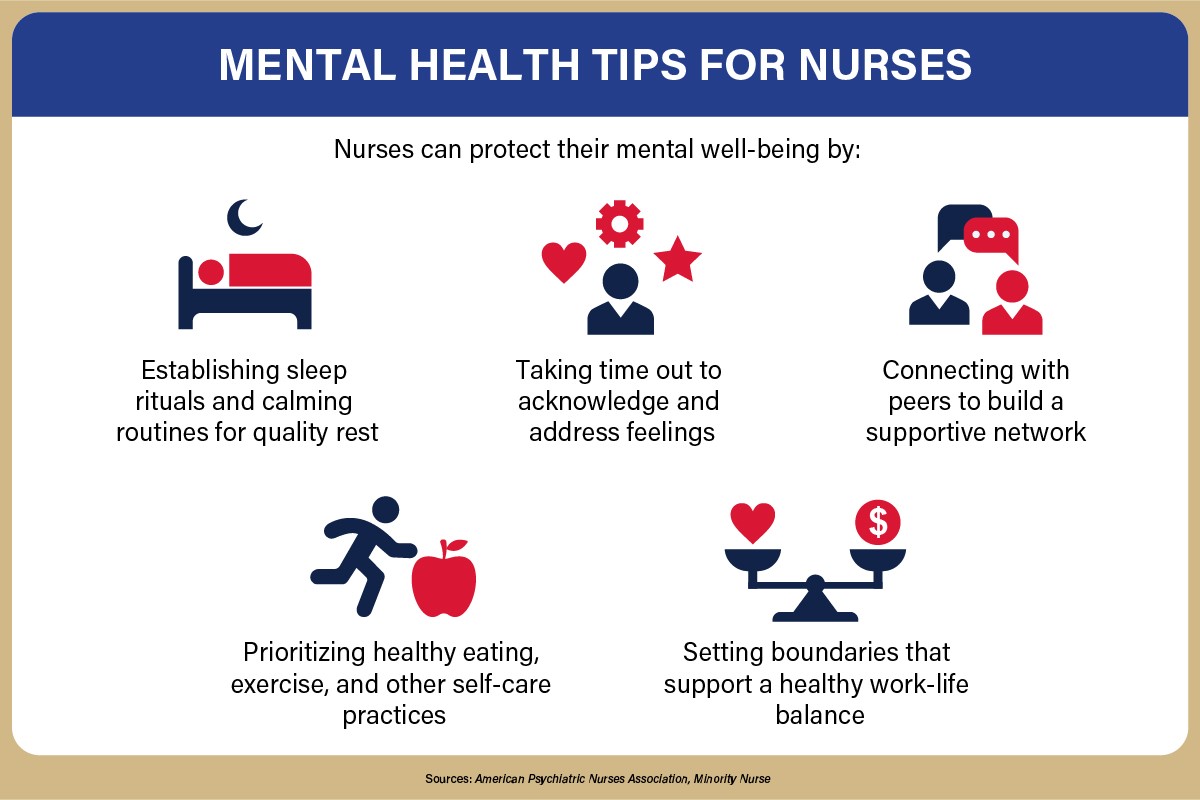Mental Health for Nurses: Statistics and Resources
Written by:
University of Tulsa
• Mar 1, 2024

Whether leading the charge in disease prevention or being the first to identify health emergencies, nurses hold the fabric of patient care together. However, a career as a nurse can be stressful and several challenges can negatively affect their mental well-being.
From complex nurse-patient dynamics to the toll of irregular schedules, nurses often face workplace pressure. Factors such as emotional exhaustion, understaffing, and burnout — all catalyzed by the COVID-19 pandemic — have intensified the pressure and have left some nurses at the end of their rope.
Nurses’ mental well-being can impact patient care and the overall effectiveness of health care. Nurses need to prioritize their mental health, and health care leaders need to make nurses’ mental health a top priority as well.
The Current State of Mental Health in Nursing

Recent surveys by McKinsey & Co. indicate that nurses face pressing mental health concerns: More than half of nurses report burnout symptoms, 64% of nurses reported feeling “a great deal of stress,” two-thirds of nurses weren’t receiving mental health support, 1 in 10 nurses lacked the financial resources for mental health support, and 56% of nurses believed that mental health challenges were stigmatized in their profession.
Mental health in nursing has become an increasingly critical issue. The demanding nature of the profession combined with the impact of the COVID-19 pandemic and ongoing workforce shortages have placed nurses under unprecedented levels of stress.
Against this backdrop, the American Nurses Foundation and McKinsey & Co. surveyed more than 7,000 nurses in 2023 to provide a snapshot of the challenges that nurses grapple with, both mentally and professionally. The collaborative effort sheds light on the persisting issues affecting nurses’ mental health. It also offers insights into how health care leaders can best safeguard the well-being of those who dedicate their lives to caring for others.
Despite some reduction in nursing turnover from its peak in 2021, the numbers remain high. About 39% of surveyed nurses intended to leave their current positions within the next six months. Nurses directly involved in patient care were about a third more likely to want to leave their positions than those in nondirect patient care roles.
Several factors influenced their decision to leave, including the following:
- Perceived lack of value from their organizations
- Insufficient staffing levels
- Inadequate compensation
Concern over low pay was especially pronounced among nurses with fewer than 10 years of experience, a group key to a stable workforce in the future.
Nurse burnout persisted: 56% of nurses experienced symptoms such as emotional exhaustion, while 64% felt “a great deal of stress” in their roles.
Nurses with less tenure reported higher dissatisfaction, increased likelihood of leaving their roles, and elevated burnout rates. Despite these challenges, a staggering two-thirds of nurses indicated not receiving support for their mental health. Moreover, 56% believed that a stigma is attached to mental health challenges within their profession.
The reasons that nurses said they don’t seek professional mental health support include the following:
- Lack of time
- Belief that they can manage their mental health issues independently
- Financial constraints
Nearly 2 in 3 nurses expressed reluctance to share mental health issues with their managers or colleagues due to concerns about:
- Confidentiality
- Job security
- Perceived inaction on the issue
Another survey of nurses conducted by Trusted Health in 2022 suggested that the health care industry had a long way to go in supporting nurses’ mental health. An alarming 95% of nurses said either their mental health wasn’t treated as a priority or the measures in place to address their mental health were inadequate.
A concerning 64% of nurses, particularly those aged 20-39, reported decreased commitment to nursing since the onset of the COVID-19 pandemic, highlighting the urgent need to address the mental health challenges faced by nurses.
Pressing Issues Impacting Nurses’ Mental Health
Nurses spend approximately half their shifts in direct contact with patients. This extensive interaction places a significant responsibility on nurses regards patient outcomes. However, the challenging work environments that nurses navigate often make it hard for them to maintain the quality of care and support that patients require.
Ensuring patients’ well-being under less than ideal circumstances can cause nurses a great deal of distress and compromise their mental health.
From managing long working hours to processing emotionally intense interactions with patients, nurses need to find a balance between providing quality care and managing their own well-being.
The Nurse Burnout Crisis
As health care providers on the front line, nurses not only deliver direct care to patients but may also confront heavy administrative burdens, a lack of resources, and unsupportive leadership. Collectively, these issues and others can contribute to nurses’ stress and ultimately to nurse burnout.
Burnout casts a long shadow over the nursing profession; a 2023 survey found that about 8 in 10 nurses believed that they’d experienced burnout at some point in the last year. Nurses with burnout typically experience the following symptoms:
- Emotional Exhaustion: This symptom is characterized by a pervasive feeling of being drained emotionally, leading to a reduced ability to cope with the demands of the job.
- Depersonalization: This symptom is characterized by a cynical and detached attitude toward work, colleagues, and patients that can result in a lack of empathy.
- Reduced Feelings of Accomplishment: This symptom is characterized by a diminished sense of personal achievement and a decline in perceived competence at work.
- Increased Irritability: This symptom is characterized by a heightened sensitivity to stressors, leading to greater impatience and a reduced ability to cope with workplace challenges.
- Physical Symptoms: These symptoms include headaches, muscle tension, and gastrointestinal issues.
- Reduced Job Satisfaction: This symptom is characterized by a decline in overall job satisfaction and motivation to perform at their best.
Staffing Ratios
The evidence paints a clear picture: Appropriate nurse staffing levels save lives. Unfortunately, a significant number of nurses grapple with high nurse-to-patient ratios, but not without consequence.
Inadequate staffing levels can negatively affect how nurses experience their jobs in many ways.
Workload Intensity
High nurse-to-patient ratios require nurses to care for more patients during their shifts. As a result, nurses may struggle to allocate sufficient time and attention to each patient. To keep up, nurses may push themselves past their limits. This can lead to unsustainable levels of stress and fatigue over time and impact nurses’ mental health.
Emotional Exhaustion
In addition to completing clinical tasks, nurses give patients emotional support. When nurse-to-patient ratios are high, nurses may struggle to provide the emotional support and personalized care that patients need.
They may also find themselves overextended emotionally; this can lead to feelings of burnout and harm their well-being.
Patient Safety Concerns
Studies have found links between high nurse-to-patient ratios and increased risks of incidents that can harm patients and compromise their safety. When understaffed, nursing teams may struggle to monitor and address the needs of all their patients. This can potentially lead to nurses making medical errors.
Such errors not only harm patients but can also leave nurses with feelings of guilt. The emotional toll of knowing that patients’ safety may be compromised can weigh heavily on nurses.
Reduced Job Satisfaction
High nurse-to-patient ratios can reduce nurses’ ability to provide quality care and build meaningful connections with patients. This typically affects job satisfaction. When nurses can’t meet the expectations that they set for themselves in patient care, they may feel a diminished sense of professional fulfillment.
Scheduling Issues
Nurses often contend with demanding schedules, working shifts that exceed eight hours. This extended time spent on duty not only contributes to their physical exhaustion but also limits their ability to get essential rest, so they can recover.
The conventional approach of fixed schedules, often set weeks in advance, and involving three 12-hour shifts per week can leave nurses dissatisfied. A nurse career and satisfaction survey found that 71% of nurses wanted greater control over their schedules.
Nurses, similar to other professionals in the workforce, are pushing for more flexible and innovative scheduling options that can help strike a crucial balance between their professional commitments and their personal lives.
More than half of the surveyed nurses felt that the traditional scheduling model adversely affected their job satisfaction. The rigidity of scheduling, coupled with the underlying issue of understaffing, can interfere with nurses’ ability to address their mental health needs.
Why Mental Health for Nurses Is Important
Nurses play an indispensable role in the health care system. Beyond administering treatments and various other clinical duties, they advocate for and educate patients. Their work also positions them to provide patients with holistic care.
Nurses’ mental well-being directly influences their ability to provide quality care, make critical decisions, and practice with compassion. Mental health challenges, however, can compromise the effectiveness of a nurse’s work and simultaneously spike turnover rates.
Prioritizing nurse mental health isn’t just a matter of employee well-being — it’s an essential investment in the entire health care system.
How Health Care Organizations Can Improve Nurses’ Mental Health
By prioritizing the mental well-being of their nursing teams, health care organizations enable nurses to provide top-notch patient care and enjoy long, satisfying careers. Numerous interventions can target the factors that contribute to poor mental health among nurses.
The strategic reforms below can improve working conditions and help nurses manage their workloads.
Flexible Work Schedules
Organizations can rethink conventional models and create scheduling frameworks that give nurses greater control over their work schedules.
By adopting digital platforms or tools that facilitate interactive scheduling, organizations can help nurses tailor their schedules to personal preferences. Nurses can use these platforms to share their availability and constraints, creating a dynamic and flexible scheduling system.
Such technology allows health care organizations to introduce the following scheduling practices, which are aimed at directly addressing nurses’ mental health challenges:
- Real-Time Schedule Adjustments: Digital platforms and automated algorithms can offer real-time adjustments to schedules when unexpected situations or personal needs arise. They can also enable instant modifications that consider factors such as staffing levels and nurse preferences.
- Communication Channels: Digital scheduling systems can include built-in communication channels for instant collaboration between nurses and administrators. This allows for quick resolution of scheduling conflicts and accommodation of personal needs.
- Emergency Response Protocols: Real-time schedule adjustments allow organizations to create predefined protocols for emergency situations or unforeseen events. These protocols guide administrators in making rapid decisions to maintain staffing levels, redistribute workloads, and support nurses during unexpected circumstances.
Mental Health Resources and Support
Health care organizations can proactively address mental health by providing nurses with the support needed to effectively manage stress and build resilience.
This support can involve investing in mental health resources to support nurses dealing with burnout. Offering free or subsidized access to therapy or counseling services can serve as a valuable lifeline, providing nurses with a confidential space to address burnout and the emotional toll of their roles.
Moreover, establishing support networks, forums for sharing mental health stories, and peer-to-peer support can create a culture of openness and encourage nurses to seek help without fear of judgment or repercussions. Implementing mental health education programs and support groups within health care organizations fosters a culture of understanding and resilience.
By prioritizing these initiatives, health care organizations not only invest in the well-being of their nursing workforce but also contribute to creating a sustainable and supportive environment in which nurses can thrive.
Optimal Nurse-Patient Ratios
Nearly 8 in 10 nurses say their units are understaffed. Adjusting nurse-patient ratios so that they’re at optimal levels is a crucial step to boosting nurses’ mental well-being.
Health care organizations can conduct thorough assessments to determine appropriate staffing levels. By maintaining balanced ratios, nurses can provide high-quality care, experience less stress, and foster a healthier work environment. This intervention not only addresses burnout but also directly contributes to improved patient outcomes.
National Nurses United has proposed recommendations on nurse-to-patient ratios that allow for safe nursing care. Health care organizations can refer to these recommendations and adopt policies that ensure that staffing levels align with patient needs and help prevent overburdening nurses with excessive patient loads.
Mental Health Tips for Nurses

According to the American Psychiatric Nurses Association and Minority Nurse, nurses can protect their mental well-being by establishing sleep rituals and calming routines for quality rest; taking time out to acknowledge and address feelings; connecting with peers to build a supportive network; prioritizing healthy eating, exercise, and other self-care practices; and setting boundaries that support a healthy work-life balance.
As guardians of health, nurses devote themselves to caring for others. However, nurses must pay attention to their own needs. The demanding nature of the profession, compounded by the seismic impact of the COVID-19 pandemic, has shone a light on the pressing need for nurses to prioritize their mental health.
The nurse mental health tips below can help these essential professions manage the rigors of their roles with resilience.
Establish Sleep Rituals
Quality rest is foundational to mental health. Nurses can benefit from establishing soothing sleep rituals that offset their demanding workloads. A calming bedtime routine sends signals to the body and mind that it’s time to unwind. This encourages greater relaxation and promotes more restorative sleep.
Routines can include reading a book, practicing deep-breathing exercises, or drinking calming teas. Consistency in sleep and wake-up times is also crucial to regulate the body’s internal clock.
Moreover, making a habit of unplugging — both literally and figuratively — at least 30 minutes before bedtime can improve the quality of sleep. This slight change helps set the stage for a restful night.
Acknowledging and Addressing Feelings
In the fast-paced and often emotionally charged environment of nursing, acknowledging and addressing one’s emotions is a vital part of self-care for nurses. Amid long shifts and demanding patient interactions, taking intentional moments to reflect on one’s feelings can serve as a lifeline. Whether taken during breaks or after particularly demanding encounters, these checkpoints offer nurses a chance to recalibrate before forging ahead.
Additionally, nurses can consider the practice of journaling, a private and cathartic outlet that can allow them to articulate their thoughts on paper and gain clarity.
Connecting With Peers for a Supportive Network
Support networks can be both comforting and validating for nurses. They allow nurses to connect with peers who can relate to their experiences and challenges. These networks can serve as important emotional outlets for nurses.
Whether gathering for conversation in the break room or at a local cafe, nurses can share anecdotes and strategies that help them cope with the day’s stresses. They can also express their feelings and discuss concerns to empathetic listeners. These impromptu chats help forge connections and camaraderie and make for a more supportive workplace.
Support groups can also become avenues for nurses to find solace and understanding. Weekly gatherings can allow nurses to discuss their triumphs and tribulations while simultaneously creating a sense of belonging.
Taking it a step further, team-building activities can inject an element of fun and unity among nurses. Whether participating in a cooking class or an escape room challenge, these shared experiences strengthen bonds and create a network that extends beyond the clinical setting.
Prioritizing Self-Care
Prioritizing self-care involves incorporating consistent practices that contribute to overall well-being. Nurses can begin by cultivating healthy eating habits. This may mean limiting their sugar intake and preparing wholesome meals filled with a mix of fruits, vegetables, and protein that give them sustained energy during work shifts.
Regular physical exercise can boost nurses’ physical health, and it’s a proven mood enhancer. Nurses can opt for the stairs instead of the elevator to give themselves small bursts of activity during their daily routine. They may also take yoga classes or join a gym. Commitments to exercise not only benefit a people’s physical well-being but also positively impact their mental resilience.
Self-care also means carving out time for activities that bring joy and relaxation. Nurses can unwind after a long day with a playdate with their dog or by immersing themselves in a cherished hobby. Such intentional breaks from the demands of nursing help foster a sense of balance and can promote mental rejuvenation.
Setting Boundaries
A healthy work-life balance is key to protecting mental health for nurses. This is especially true for nurses who deal with demanding schedules and emotionally intense work.
To maintain such a balance, nurses need to set clear boundaries. This involves clearly defining their work hours and letting colleagues and supervisors know about these limits. Outside of work, nurses can actively steer clear of job-related calls or emails. This intentional separation creates dedicated time for much-needed recharging, relaxation, and engagement in activities that contribute to a nurse’s mental and emotional well-being.
Whether spending quality time with family, diving into hobbies, or simply enjoying moments of solitude, staking claims on their time allows nurses to create a deliberate balance. This empowers them to bring their best selves to every aspect of their lives.
Nursing Students Tips That Protect Mental Health
Nursing school can be both rewarding and challenging. The pressure to master medical knowledge, develop clinical skills, and navigate high-pressure clinical settings reflects the rigorous nature of the nursing profession.
Studies indicate that like nurses, nursing students confront mental health issues that require specific attention. Many mental health tips for nurses can also apply to nursing students. However, considering strategies that specifically address nursing student mental health is important.
Below are some mental health tips for nursing students that can help them stay resilient.
Effectively Manage Academic Stress
Nursing students often encounter intense academic pressures, from demanding coursework to clinical rotations. To manage their stress, nursing students can establish effective study routines. The routines may involve breaking down tasks into manageable steps and prioritizing self-care during busy periods.
Additionally, nursing students can take advantage of resources provided by their academic institution, such as tutoring services and study groups. These study groups not only foster academic collaboration but also provide a space where nursing students can share experiences, discuss challenges, and offer mutual encouragement.
Seek Out a Mentor
Mentors can offer guidance and support to nursing students, helping them navigate the challenges of nursing education. With the insights and advice of experienced mentors, nursing students can more easily make sense of academic and clinical requirements. This can alleviate a great deal of stress and anxiety and provide a pillar of support to nursing students.
To find a mentor, nursing students can:
- Reach out to faculty members. Professors and instructors often provide mentorship or connect students with suitable mentors.
- Attend academic events. Participating in conferences, workshops, or seminars can provide students with a chance to meet experienced nursing professionals who may be open to mentorship.
- Connect with preceptors. During clinical rotations, nursing students can build relationships with experienced nurses who serve as preceptors. Students can then express their interest in mentorship to these preceptors.
- Join professional organizations. Nursing associations and organizations often facilitate mentorship programs or provide opportunities to connect with experienced nurses.
Balance Clinical and Classroom Learning
Nursing students often juggle theoretical knowledge with practical application in clinical settings. Balancing clinical and classroom learning plays a vital role in the academic success of nursing students. It also factors into their mental health.
Consider the following strategies that can help nursing students balance their studies and avoid excessive stress in the process:
- Create a schedule. Develop a weekly or monthly schedule that outlines both class and clinical commitments. Include time for studying, assignments, and personal activities.
- Prioritize and plan. Determine which assignments, exams, or clinical experiences require immediate attention. Prioritize tasks based on urgency and importance.
- Set goals. Establish short- and long-term goals for both classroom and clinical learning. Divide larger tasks into manageable steps.
- Use time wisely. Maximize study sessions by focusing on the most challenging topics first. Divide study sessions into shorter, focused intervals for better retention.
- Avoid procrastination. Start assignments and study preparations early to avoid last-minute stress.
- Stay organized. Use planners, calendars, or digital tools to stay organized, and keep track of assignments, deadlines, and exam dates.
- Ask for feedback. Request feedback on clinical performance and academic work to identify areas for improvement. Seek guidance from instructors to enhance understanding of the nursing profession.
Protect and Promote the Mental Health of Nurses
The mental health of nurses isn’t just a matter of individual concern; it’s a collective imperative for the entire health care system. By promoting mental health awareness, proactive interventions, and supportive environments, health care organizations can improve the resilience and job satisfaction of nurses. They also contribute to the overall quality of patient care.
Infographic Sources:
American Psychiatric Nurses Association, Self-Care Tip Sheet for Nurses
McKinsey & Co., “Understanding and Prioritizing Nurses’ Mental Health and Well-Being”
Minority Nurse, “Strategies to Maintain Your Mental Health as a Health Care Worker”


